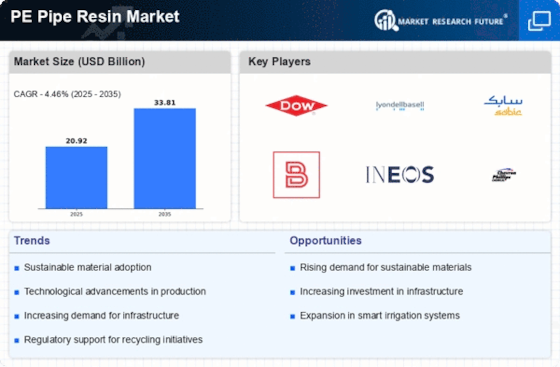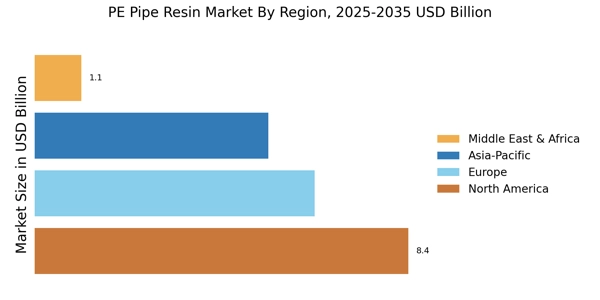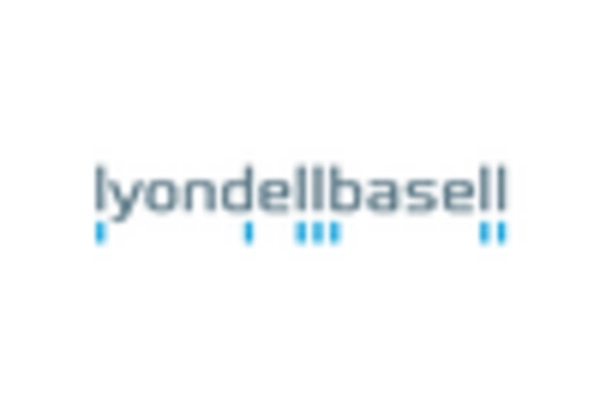Growth in Agricultural Applications
The agricultural sector's increasing reliance on efficient irrigation systems is significantly impacting the PE Pipe Resin Market. With the global population projected to reach 9.7 billion by 2050, the need for sustainable agricultural practices is paramount. PE pipes are widely utilized in drip and sprinkler irrigation systems due to their flexibility and resistance to chemicals. Recent statistics indicate that the agricultural irrigation market is expected to grow at a rate of 7% annually, further propelling the demand for PE pipe resins. This growth reflects a broader trend towards optimizing water usage in agriculture, thereby enhancing the overall efficiency of food production. As such, the PE Pipe Resin Market stands to benefit from this agricultural shift.
Rising Demand for Water Infrastructure
The increasing need for efficient water management systems is driving the PE Pipe Resin Market. As urban populations expand, the demand for reliable water supply and distribution systems intensifies. According to recent data, the water infrastructure sector is projected to grow at a compound annual growth rate of approximately 6% over the next five years. This growth is largely attributed to the necessity of replacing aging pipelines and enhancing water quality. PE pipes, known for their durability and resistance to corrosion, are becoming the preferred choice for municipalities and private sectors alike. Consequently, this trend is likely to bolster the PE Pipe Resin Market, as manufacturers ramp up production to meet the escalating demand.
Increased Focus on Sustainable Materials
The growing emphasis on sustainability is reshaping the PE Pipe Resin Market. As environmental concerns gain prominence, there is a marked shift towards using eco-friendly materials in construction and infrastructure projects. PE pipes, being recyclable and energy-efficient, align well with these sustainability goals. Recent studies indicate that the market for sustainable building materials is expected to grow by 8% annually, which could significantly influence the demand for PE pipe resins. This trend reflects a broader societal shift towards responsible consumption and production practices, suggesting that the PE Pipe Resin Market may experience a robust expansion as stakeholders prioritize sustainability in their projects.
Regulatory Support for Infrastructure Projects
Government initiatives aimed at improving infrastructure are playing a crucial role in the PE Pipe Resin Market. Many countries are implementing policies that prioritize the development of modern water and sewage systems. For instance, funding programs and incentives for infrastructure upgrades are becoming more prevalent, which is likely to stimulate demand for PE pipes. Recent reports suggest that infrastructure spending is expected to increase by 10% in the coming years, particularly in developing regions. This surge in investment is anticipated to create a favorable environment for the PE Pipe Resin Market, as manufacturers align their production capabilities with the anticipated rise in infrastructure projects.
Technological Innovations in Pipe Manufacturing
Advancements in manufacturing technologies are transforming the PE Pipe Resin Market. Innovations such as improved extrusion processes and enhanced resin formulations are leading to the production of higher quality and more efficient pipes. These technological developments not only reduce production costs but also enhance the performance characteristics of PE pipes, making them more appealing to end-users. For instance, the introduction of multi-layered pipes has improved pressure resistance and longevity. As these technologies continue to evolve, they are likely to attract new investments and drive growth within the PE Pipe Resin Market, as manufacturers seek to capitalize on the benefits of these innovations.

















